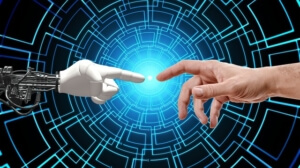Artificial Intelligence

What Is Artificial Intelligence (AI)?
Artificial Intelligence (AI) refers to machines and computer programs designed to perform tasks that usually require human intelligence. These tasks include learning, reasoning, problem-solving, perception, and decision-making. AI combines various fields like machine learning, natural language processing, computer vision, robotics, and expert systems.
Artificial Intelligence, AI technology, machine learning, deep learning, AI applications, AI ethics, AI risks, future of AI, narrow AI, general AI, AI in healthcare, AI in finance
Key Subfields of AI
Machine Learning: This teaches computers to learn from large datasets and improve over time without explicit programming.
Natural Language Processing (NLP): Enables machines to understand and interpret human language.
Computer Vision: Focuses on machines recognizing and analyzing images and videos.
Robotics: Involves designing autonomous machines that interact with the physical environment.
Expert Systems: Programs that mimic expert human decision-making for complex problems.
Types of Artificial Intelligence
There are two main types of AI:
Narrow AI (Weak AI): Designed for specific tasks like voice recognition, language translation, or playing chess. Most AI today falls under this category.
General AI (Strong AI): Hypothetical AI that matches human intelligence across multiple tasks and domains, capable of independent reasoning.
How AI Works: Learning and Autonomy
AI systems learn by analyzing large volumes of data, finding patterns, and improving their performance. For example, machine learning algorithms continuously refine themselves to become more accurate. Some AI systems can operate independently, such as self-driving cars or facial recognition software, making decisions without human input.
AI Applications Across Industries
AI is transforming multiple sectors, including:
Healthcare: AI helps analyze medical images and assist in diagnosis.
Finance: AI detects fraud and enhances investment decisions.
Transportation: Self-driving cars and traffic optimization rely on AI.
Manufacturing: AI boosts productivity and automates processes.
Entertainment: AI personalizes content recommendations and creates virtual characters.
Ethical Concerns and Risks of AI
While AI offers many benefits, it also raises critical ethical and societal questions:
Job Displacement: Automation may replace human jobs, impacting employment.
Bias and Discrimination: AI can inherit biases from its training data, leading to unfair outcomes.
Privacy: AI systems process vast personal data, risking privacy breaches.
Safety: Autonomous systems, like drones or vehicles, may malfunction, causing harm.
Misuse: AI could be weaponized or used in cyberattacks.
Researchers and policymakers are actively developing guidelines to address these challenges.
The Future of AI
AI research is advancing rapidly. Scientists aim to develop Artificial General Intelligence (AGI) capable of human-like reasoning across domains. Additionally, breakthroughs in quantum computing may further revolutionize AI’s capabilities. The future holds exciting possibilities but also requires responsible development.
Is AI Dangerous?
AI technology carries risks if misused or poorly managed. However, many experts agree that the potential dangers depend on how and where AI is applied. Responsible innovation and regulation are key to ensuring AI benefits society safely.
External Resources for Further Reading
MIT Technology Review on AI (opens in a new tab)
Stanford AI Index Report (opens in a new tab)
OpenAI Blog (opens in a new tab)
Conclusion
Artificial Intelligence is reshaping how we live and work. Understanding AI’s types, applications, benefits, and risks helps us navigate its impact. Visit Jordan Maxwell Videos to explore more insightful content on AI and other groundbreaking topics.


